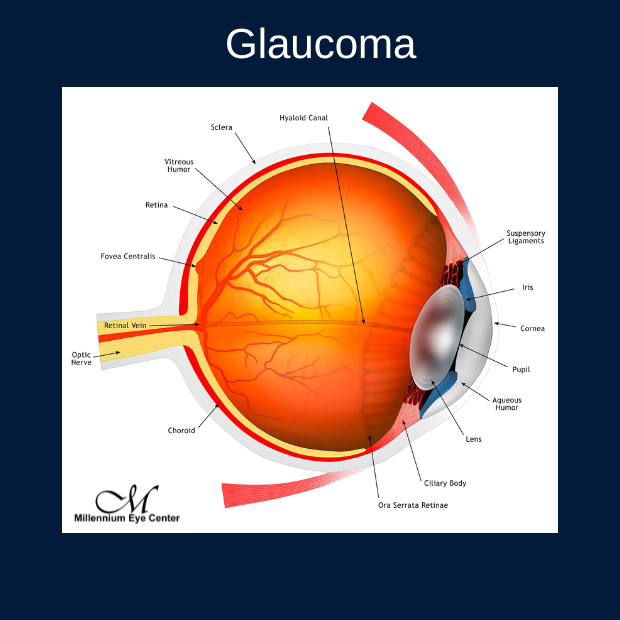Brief Review of Glaucoma:
Glaucoma encompasses a set of eye conditions often triggered by increased pressure within the eye, referred to as intraocular pressure (IOP). While normal IOP ranges between 12 to 18 mmHg, exceeding 20 mmHg significantly escalates the risk of developing this sight-threatening condition.
The elevated pressure damages the optic nerve permanently, leading to a condition known as ‘Tunnel Vision.’ Eye doctors primarily address glaucoma by lowering IOP through medications or surgical interventions. To learn more about Glaucoma, check out our Glaucoma 101 blog.
Nutritional Guidance for Glaucoma:
Encouragingly, recent research indicates that specific dietary choices and supplements, combined with lifestyle adjustments, may mitigate the risk of elevated eye pressure or hinder the deterioration of eye health. It’s crucial to consult Dr. Lauretta and your primary care provider before altering your diet significantly.
Here are six dietary recommendations for individuals managing glaucoma or at risk of its onset:
-
Incorporate Omega-3s:
- Omega-3 fatty acids possess the ability to decrease internal eye pressure, making them beneficial for individuals with glaucoma. These acids enhance blood flow to the optic nerve and offer neuroprotective effects.
Sources of Omega-3s include fatty fish like salmon, seeds such as chia, nuts, certain plant oils, and fortified foods.
-
Caffeine Moderation:
- Limiting caffeine intake is advisable for those dealing with high eye pressure, as caffeine temporarily elevates IOP after consumption. While enjoying one cup of caffeinated coffee daily is generally safe, excessive consumption is discouraged.
Consider switching to decaffeinated coffee if you consume multiple cups daily.
-
Consider Supplements:
- Achieving all necessary vitamins, minerals, and nutrients solely through diet can be challenging. Hence, high-quality supplements may complement traditional glaucoma treatments.
Supplements containing Vitamins B1, B12, C, A, E, thiamine, magnesium, and mirtogenol, along with herbal options like ginkgo biloba, bilberry, and forskolin, may aid in combating glaucoma. For a customized supplementation regimen, schedule a wellness appointment with Dr. Lauretta to determine the most suitable supplement options for your condition through our integrative eye care program.
-
Embrace Leafy Greens:
- Dark leafy greens are rich in essential vitamins and nutrients, including dietary nitrates, vitamins A, B, C, E, K, folate, magnesium, iron, calcium, and potassium.
Research suggests that individuals consuming substantial amounts of dark leafy greens have a significantly lower risk of developing glaucoma. Incorporating kale, spinach, watercress, chard, mustard greens, arugula, romaine lettuce, and collard greens into your diet can be beneficial.
-
Increase Antioxidant Intake:
- Antioxidants safeguard the body’s cells against harmful free radicals. Although animal studies suggest that antioxidants may regulate IOP, large-scale human trials are required to confirm this.
Foods rich in antioxidants include dark chocolate, berries, pecans, red cabbage, beets, beans, artichokes, and dark leafy greens.
-
Hydration Strategy:
- Sufficient hydration is crucial for overall bodily functions, including eye health. While consuming approximately 2 liters of water per day is recommended, it’s essential to hydrate consistently throughout the day rather than consuming large volumes at once.
Always seek guidance from your primary care physician before implementing significant dietary changes.

